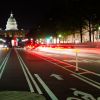Here’s How Big Tech is Spending Millions in Washington

New filings show Facebook nearly doubled its lobbying expenses to $6.4 million last year. As other tech companies follow suit, here’s what you should watch.
Let 2013 be remembered as the year Silicon Valley made friends with Capitol Hill. The biggest tech companies–and their fast-growth startup counterparts–certainly pumped enough money into K Street to gain significant influence in Washington.
Lobbying fees jumped significantly among major tech companies from 2012 to 2013, which became clear Wednesday as the final lobbying disclosures were filed by the likes of Facebook, Twitter, and Yelp. The issues these and other large tech firms spent significant sums on included reforming the National Security Agency’s surveillance programs, pressing to fight patent trolls, and encouraging immigration reform.
Facebook plowed more than $6.4 million into lobbying last year, nearly twice the $3.8 million it spent the year before, according to lobbying disclosure documents finalized on Tuesday evening.
Newly public Twitter hired lobbyists for the first time in 2013, according to filings. It spent a total of $90,000 for influence in Washington.
Where are the other big Internet companies, including Yahoo, Amazon, and AOL? They’re members of the Internet Association, which, in its inaugural year last year, spent $1.6 million on lobbyists to influence regulators and lawmakers. The Internet Association, focuses on immigration reform and promoting temporary H-1B visas, which are a popular way for tech companies to bring in foreign engineering talent.
There are a few private startups in the Internet Association mix, too. They include Airbnb, Gilt, Path, Uber, and Zynga.
It seems that Yelp dove into the K Street game for the first time in 2012, spending a comparatively slight sum of $30,000.
If you follow the money, writes The Hill, you’ll find these are three bills major tech companies are spending the most to influence:
1. Innovation Act.
This bill, proposed by Representative Bob Goodlatte (R., Va.) would thwart patent trolls, known for hoarding patents and suing companies using similar or overlapping technologies.
Status: Passed by the House; having trouble gaining traction in the Senate.
2. Geolocation Privacy and Surveillance Act.
This bill from Senator Ron Wyden (D., Ore) and Representative Jason Chaffetz (R., Utah) would impose limits on the ability of companies and government agencies to secretly track a person’s location.
Status: In committee, awaiting consideration by the House and Senate.
3. USA Freedom Act.
This bill, supported by Senator Patrick Leahy (D., Vt.) and Representative James Sensenbrenner (R., Wisc.) would curb some of the surveillance programs at the NSA and stop the bulk collection of telephone records.
Status: Has attracted much support in both the Senate and the House, but does not appear to alighn with President Obama’s surveillance-reform goals.
![]()






Leave a Reply